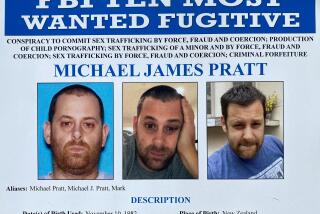Kraft Lawyers to Enter Next Phase Fighting
- Share via
His family adores him. Close friends support him. Former co-workers boast he was personable, bright, a hard worker. But the question for Randy Steven Kraft is whether their testimony, if it happens, will be enough to spare him from a death verdict.
The 44-year-old computer consultant, convicted by a jury two months ago of 16 Orange County murders, returns to Superior Court in Santa Ana on Monday as his attorneys begin their case in the penalty phase of the trial.
Prosecutors claim Kraft may be the most prolific serial killer in the country, responsible for at least 45 murders in three states over 11 years. But for Kraft’s death penalty hearing, Deputy Dist. Atty. Bryan F. Brown has chosen to introduce just eight slayings in addition to the 16 murders in the conviction. Those occurred in Oregon and Michigan.
Kraft’s lawyers acknowledge that the jurors will begin their penalty deliberations convinced that Kraft killed 24 people. Their efforts in the next few weeks, they have said, will focus on Kraft’s background and character--not a defense of the eight out-of-state slayings.
“We’re going to try like hell to save his life,” said Kraft lawyer C. Thomas McDonald. “But no, it’s not going to be easy.”
Kraft, who had lived a quiet life style in Long Beach’s gay community, was arrested May 14, 1983. Two California Highway Patrol officers had stopped him for a traffic violation on the San Diego Freeway at 1 a.m. and found a dead Marine in the front passenger seat of his car.
Though Kraft has claimed his innocence in all the killings, he has not testified. And much of the evidence against him was left unexplained, such as color pictures of some victims, obviously dead or unconscious, found in his car.
But many people after the Kraft trial have speculated that the defense lawyers, knowing Kraft would be convicted, have invested much of their time preparing to fight the death penalty.
The lawyers have kept their plan a closely guarded secret. Superior Court Judge Donald A. McCartin gave Kraft’s lawyers more than a month to complete their preparations after prosecutors completed their penalty case.
“Will we see a lot of Randy’s friends, or will it be the shrinks?” one law enforcement official said, wondering whether Kraft’s lawyers will rely on psychiatrists to explain their client to the jury.
If Kraft’s lawyers argue to jurors, with help from psychiatric testimony, that Kraft didn’t know what he was doing, or couldn’t help himself, the problem they face is Kraft’s claims of innocence.
“How can his lawyers argue he has such a twisted mind he shouldn’t be sent to the gas chamber, when their position in the trial has been that Kraft has never killed anyone?” a defense lawyer said.
Kraft has not testified. His lawyers decided against it after McCartin refused to guarantee them he would limit cross-examination by Brown.
But the question arises again. If Kraft takes the stand and continues to claim his innocence, he could open the door for Brown to ask him about dozens of other slayings the jurors have never heard about.
The defense also might keep Kraft off the stand if they are convinced their only real chance to save him is through appeal. The defense claims Kraft has not had a fair trial because the judge should have separated the case into several trials.
“Put anyone on trial for 16 murders, and the jurors will inherently believe he must be guilty,” Kraft lawyer James G. Merwin has said.
‘Mate’ Ready to Testify
Another question is whether jurors will hear from Kraft’s former “mate” as they referred to each other--Jeff Selig, who has not testified to date. But Selig reportedly is still friends with Kraft, and is ready to testify on his behalf.
While Kraft’s lawyers have adopted the public posture that their client is innocent, they have tried to learn more about what makes a person become a serial killer.
They have reportedly hired as a consultant James Alan Fox, a Northeastern University associate professor in criminal justice, who has written extensively about serial killings.
In a recent book he co-wrote with another Northeastern professor, Jack Levin, they said that “in most respects (serial killers) are extraordinarily ordinary.”
“Many mass killers are otherwise law-abiding citizens who belong to the local church, pay their taxes, attend ballgames, play with their children and complain about corruption in high places.”
They also wrote in their book, “Mass Murder (America’s Growing Menace),” that “public support for the execution of mass murderers is now overwhelming.”
Strong Support From Kin
But McDonald and Merwin say they are going into the next phase of the trial fighting. And Kraft will no doubt have strong support from his three sisters, his brothers-in-law and nieces, and his parents. Most of them have already attended portions of his trial, and in guarded statements, have said they believe he is innocent.
After Kraft’s conviction, one of his sisters, Kay Plunkett, cautioned reporters: “It’s not over yet.”
But Kraft’s lawyers already know what prosecutor Brown’s closing argument is going to say. He will surely remind jurors of their own words.
During jury selection, each of the 10 women and two men on the jury said that they could vote for a death verdict if a defendant’s crimes were serious enough.
Said one defense lawyer after the case: “Brown will tell those jurors that if they can’t send someone to the gas chamber who has killed 24 people for his own pleasure, for whom would they be saving it?”
More to Read
Sign up for Essential California
The most important California stories and recommendations in your inbox every morning.
You may occasionally receive promotional content from the Los Angeles Times.













